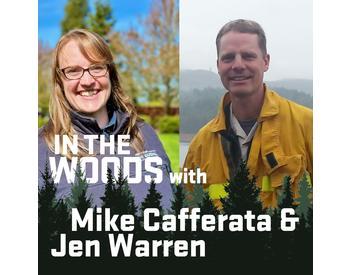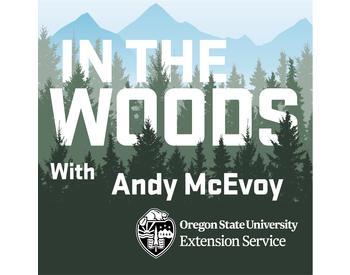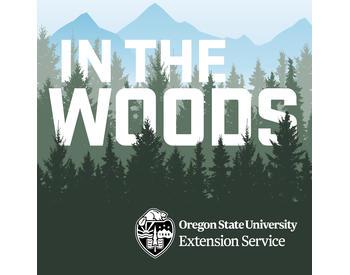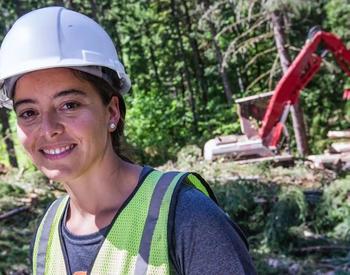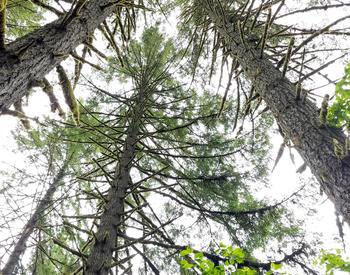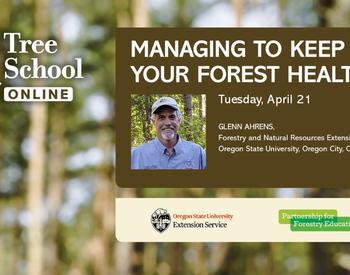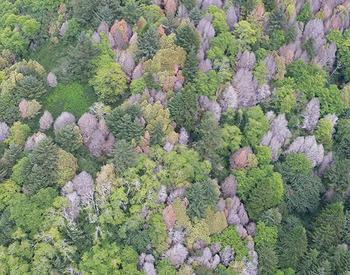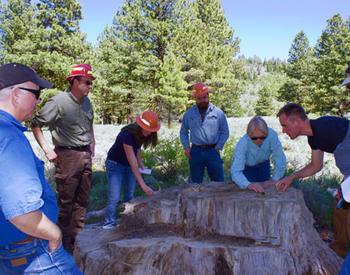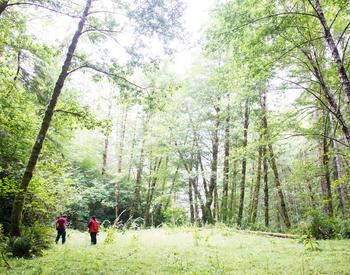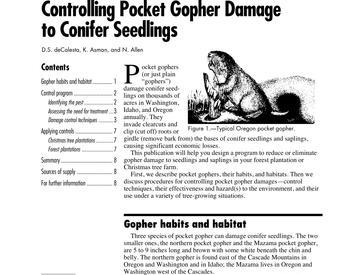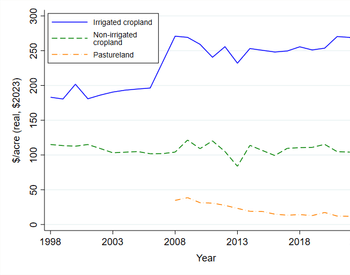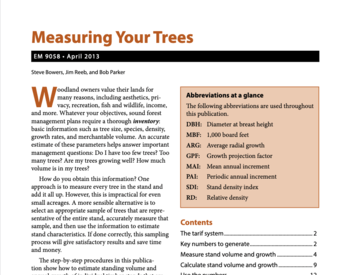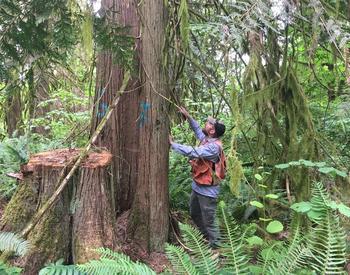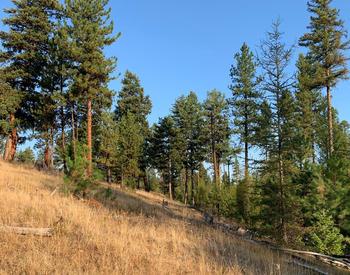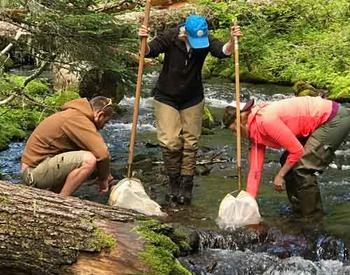Transcript
From the Oregon State University's extension service, you are listening to In the Woods with the forestry and natural resources program. This podcast aims to show the voices of researchers, land managers, and members of the public interested in telling the story of how woodlands provide more than just trees. They provide interconnectedness that is essential to your daily life. Stick around to discover a new topic related to forests on each episode. Alright, welcome back to In the Woods podcast presented by the forestry and natural resource extension program at Oregon State University. I'm Jacob Putney extension agent in northeast Oregon and your host for today's episode. I'm joined today by a former professor of mine, colleague, as well as a friend, Dr. Tammy Cushing. Dr. Cushing is the extension forest business and economic specialist at University of Florida and formerly the starker chair of private and family forestry at Oregon State University where we work together in the forestry and natural resource extension program. She has a bachelor's degree from the University of Florida, master's in forest economics and taxation from Mississippi State, and a PhD in forest finance from the University of Georgia. As April 18th is right around the corner we decided that this episode should cover taxes and specifically taxes for a woodland owner. Tammy, welcome, it's great to see you, and thank you for joining us today. Thanks for having me Jake. Would you like to tell us a little bit more about yourself and some of the work that you do? Sure thing! So, uh first and foremost I like to make sure everybody knows that I am a forester um, but I really enjoy talking taxes. And mainly that's a way for me to help landowners to meet their goals. So I spend the majority of my time talking to private landowners, helping them think through what their objectives might be, and then working through kind of the tax code and the business functions that help them achieve those goals. Even if it's not income generation um or saving money I think everybody would love to save money um if your goal is recreation or wildlife, my goal would be to help you minimize the expenses that you're paying out of pocket so that you can use more of your money to spend it on recreational or wildlife habitat improvement on your property. I do spend time working with other foresters and then accountants, attorneys all those service providers that are going to work with private landowners that may or may not know one part or other of the equation, right? The attorneys and the accountants they don't understand forestry for the most part, so I'm trying to connect them to the business side and then of course the foresters they know all about the trees and managing the land and land owners, but that tax code's a little bit elusive to them and so trying to hook them up with the right words and the things that they can say to a landowner to help that landowner meet their goals. So, I look at them as a way to leverage my effort as well. I'm definitely one of those foresters that find taxes a little nebulous so we rely on folks like you that can help us out. Um, so, let's dive into it so forest taxes, uh, where do we even begin, Tammy? Well, you know the thing is with taxes there's there's just so many levels to explore of it and I think that's what makes it so fun to me is you know we can talk about it from the property tax level through the fact in Oregon you know the severance taxes or the harvest taxes that people may pay. And then of course there's state income and federal income and and then of course there's the interplay between all of those, and for each piece of that it's it's kind of understanding how to use the provisions that exist within those codes and those rules um to take everything that you're doing on your property and account for it. So, you know if you've had some expenditure, will the tax code allow you to write that off? And it's not going to explicitly say "Hey, forestry this is what you can or cannot do." There's very few places where we see that, but what we see is this language that's maybe a little bit confusing, maybe it sounds like it's written by a legislator because it was, probably a lawyer, um and trying to help people kind of understand what that means to them in forestry. And so that's kind of what I see, what I do, and what I hope to accomplish at the end of it is to put the words into english that's understandable and so um there are lots of ways for landowners to use the tax code to their advantage if they would just understand it. And part of that comes down to planning, and so the more we can help people learn, the more they can plan, the more they can hopefully save, so. So, kind of on that note, say uh say I'm a woodland owner and I'm getting ready for tax season, you know, where should I start? And you know, what are some key considerations? Oh, wow, I love when somebody comes to me and they're just getting engaged in forestry, right? Because that's that's the magic point, right? When I when I hear somebody that's had it for a much longer point in time. Sometimes we have to fix some things that got missed along the way either because they didn't understand or your tax providers didn't know to tell them this, but if you're just getting started, there are a couple really really key things that I would love to get across, and one of those is to kind of establish a record keeping system. Uh oftentimes somebody will walk into the tax return preparer and they've got you know we joke about the big hefty bag of receipts. And that's almost actually a good situation sometimes right because often it'll be like "Yeah, I did something but I don't know where the receipt is for it." So, a hefty bag would be great, um, but a shoebox, um, is it a filing system? Is it you know using one of the computer programs? Quickbooks or whatever it is to log it in and then knowing where those documents are. So, doing that on the front end, even if you don't do it the rest of your life. If you can do this for your forest operation or whatever you have going on your land, it's going to be beneficial to you down the road. We want to set up accounts um and so of course now is where I shift into the business speak, right. So, having some kind of system to account for how much of your purchase price um you, you know, how much money are you spending on this, right? So, we talk about setting up accounts. How much money have I spent on that particular stand of trees? How much money did I spend to put the barn out back? Put it together and build the barn, how much money is in that? Oh, you know, I had to go I'll put a road in on my property, how much did I spend? So, having that kind of accounting system built into a spreadsheet or whatever it is to allow you to keep track of all that, that goes really hand in hand with the record-keeping. What I will love them to do is sign the paperwork to buy the property and then start splitting up what we call their basis. And so their basis in the property is what they paid for all the expenses associated by the property. And so you take that amount you paid for it, you want to break that up into what what you bought. So, I bought trees and I bought land and maybe I bought the the barn out back, right. And so splitting that uh purchase price up in the different um accounts, right, so I have an account that says it's uh my timber and it's my young timber and, so how much do I think that young timber um my purchase price was in the young timber? And I would do that for everything I bought. So, if we could do that up front, they'll save a lot of time, a lot of energy, and a ton of frustration later when you start harvesting timber, which you know depending on the age of what you bought, that could be oh geez 15-20 years from now, or it could be two years from now. But if you don't do it when you buy it we're trying to reconstruct the past. So, I love the question of "What should I do when I buy it?" Because I can get to you ahead of time and get you to set it up, your life will be easier uh we don't have to start looking back at historical records. Speaking of spreadsheets, I could probably have a lot of fun with that I'm a huge fan of spreadsheets, but um going back to record record keeping um that's a great point. I always try to tell landowners to just write everything down whether it's planning whether it's through silviculture your objectives you know the whole thing of the forest management process and um a lot of landowners just say "Oh it's all up here, it's all up here." But um, you know, ... That's exactly right, Jake you know telling them to kind of think through it write it all down, and one thing I should mention is the importance of having a journal, um, and so you know we when I said write everything down and you say write everything out, we're thinking about the dollars, but it's also important to set up with the IRS that you're not just doing this for fun. And so when you jump in the car and you drive out to the property, make a note that you drove out to the property and you were walking the property lines that day. Or um you went you met with your forester that day and you talked about a different sources of grant funds that you could get. Or you talked about fire risk and how to reduce fire risk, or jeez you showed up at a workshop and you learned about how to do something on the property. All of that's kind of documenting in written form your effort. You can't pay yourself, but this journal is kind of a way of documenting that you're not just doing this as a hobby and and anybody who's ever heard me speak knows that hobby is one of like my least favorite words when it comes to taxes, and so that journal is really documentation that this is serious for you and this is more than just playtime. That's a really great idea, I write everything down I have a notebook right next to me and if I don't write it down I will immediately forget, so that's a really great idea. Um so let's kind of dive into the different types of taxes, or levels I guess. So, how do they differ from state to state and at the federal level? Sure so I'm going to go down to the most basic, probably one of the most hated, ones is the property tax. And it's that that mismatch of income to expense, right. We have to pay property tax regardless of whether we got any income or not, so nobody loves that, but of course that is different all across the country no matter where you are, so if you have property that even just the the one property reaches the state line. You're dealing with two potentially very different property tax systems. So, it's really important to understand the property tax system within the state that your your property's in. And each of those property tax systems not only has different rates, but it also has maybe a different starting point, right? So, one state it may be the fair market value of the property, in another state it might be half of whatever fair market value is and it's really just dependent on the systems and the policies within the state and how they look at it. Um so they all have those kind of different programs and it's important to understand that. When we start talking about income tax, well let me back up before we talk income tax, you know Oregon has a severance tax if you're in certain property tax categories, and that's not common around the country, that's only in a few states. Um and so understanding that's at play and of course again Oregon also has that harvest tax that's in play as well. So, then when you move into income tax of course most states have an income state income tax and where they really differ is where they start. So, some states they start that taxable and whatever your taxable income is for federal income tax purposes, so you'll actually look at your federal income tax return and that's you started a specific point on that return. Um others have you start from scratch and you calculate that state's version of income. And so each state has their own kind of system for getting there, but when it gets down to forestry some of them have incentives that are very very specific for forestry. I know certain states of the south have a reforestation incentive so if you're planting trees you have a tax rate for that. But certainly not all states have that and so you could have a state where you have the incentive and you have a really high starting point for income and another state has a much lower starting point for income and then doesn't have that reforestation set. So, it really just kind of depends on what the state values and what the people of the state and the legislators of the state uh want to incentivize I guess for lack of a better word. And then of course at the federal level um we all kind of know how we're going to work that we all work that the same way from state to state for the most part and then of course there are very specific incentives in there for forestry that may or may not be picked up by your state. Reforestation is a perfect example of that. It exists at the federal level but it doesn't exist in most states. So, kind of on the uh note of incentives there you know what kind of incentives are there you mentioned the reforestation one there's probably a lot more, right? And like you said, they're probably not available in each state. Yeah, so when it comes down to that that state level you know I can't speak to what every state does of course um and and that's one of the fun things about my job is I can operate on the federal level, I can move wherever I want, and I can continue to talk about income taxes. Uh the minute we go to state income taxes every time I pick up and move somewhere, I have to learn how that state is looking at income and where it starts. The one that I know that pops up most often is really that reforestation. And it's in states where there's no requirement to replant, so when i look at Oregon, Oregon has a reforestation requirement. And so there's really no need to provide an additional incentive for people to put trees in the ground. You've already mandated that if they cut they're going to do it. If you come down to the south where that mandate to replant after harvest doesn't exist, then maybe the policy decision is in order for us to get people to put trees in the ground after the harvest, we're going to throw them a tax break on their state income tax. So it's it's just really this combination of how they're playing within the rules and then what they want you to do. And then of course depends on what's being offered for Ag. producers as well, right? Sometimes forestry gets lumped in with Ag. and sometimes it doesn't get lumped with Ag. and that's really kind of state specific so I can't go any more into like state incentives because I just I really don't know in particular how they're functioning, but reforestation's the most common one. Yeah, yeah, what about like um conservation easements or like land trusts and things like that? Yeah, so sometimes conservation easements can get you a tax break um most times where you're seeing that is not if somebody sells, right? So, there's two different ways to do a conservation easement. I can sell to a conservation organization, I can sell an easement, an easement not being that I'm giving them my land, I'm giving up some right to something on my land, right? So, in a lot of cases it's the development rights. So I might sell that to a an organization um at a discounted price maybe. But I've sold it to them and if I sell it to them it's not the same as if I just donate the easements. So, I sign an agreement, say I'm not going to um sell the development rights on this property um and that's forever more so nobody can ever develop the property. In that case, that is a donation a charitable contribution in a lot of cases if the right organization's involved and so there's a lot of rules around it. But if you meet the rules, uh you could potentially take a charitable contribution charitable contribution deduction on your federal tax return. Some states will follow through with that other states do not again that's one of those things that's kind of state specific is whether you can or cannot do that. Okay, that makes sense. Um so let's go to like specific like management activities, so how about a tax year where you conducted a harvest? So, whether it was a thinning or a final harvest or some type of activity, but a net revenue was generated. So, what does that look like for that tax year? So, uh having been a student of mine I'm going to say something you've heard me say many many times and that's it depends, right? So, um of course we should always talk about the taxes, especially federal taxes, that revenue money brought in from any source we automatically assume it's taxable until you have a reason not to tax it, right? So, it's taxable income with a timber sale the question becomes what's the character of that income, so is that income like your wages right like your salary where we know that we pay ordinary income rates on it. Or is that more like the sale of a building where we pay capital gains taxes on it. And so that's really where the it depends part comes in. So, it depends on how you cut the timber and it depends on who cuts the timber, so in the most obvious example if I go out there and I'm feeling extra strong that day and I cut the timber myself. Then, that's going to be a little bit of a deviation in the tax code so it's no longer going to be capital gains income if I cut it myself. But if I cut it myself I can make an election to treat part of that as capital gains treatment and part of it will go as ordinary, and so there's a provision in there that people can utilize. Same thing if I hired if I hired you to come out and cut the timber for me and then I then you haul it to the gate and you sell it for me on my behalf to the mill, it's going to be the same situation I it's almost the same as if I cut it myself we're going to have to part of it's going to be ordinary income and part of it's going to be capital gains income and it's it's an election so you're choosing to do it and it's going to be a little bit harder than just saying here's how much I sold and here's my profit on it. So, once you jump those hurdles and you understand whether it's capital gains or ordinary income or some of both. We want to make sure that we don't forget to subtract off that basis, so that's twice I brought that term up you know at the beginning I talked about establishing that basis account um using the purchase price and kind of splitting it up among what you bought. Well, now that I'm harvesting timber I'm going to recover some of my purchase price just like as if I had a stock you know when you sell stock you only pay on the gain, the difference between what you paid for it, same thing with timber. If I sell timber I'm only going to pay the gain on um pay the tax on the gain, right? The difference between what I paid for it and what I sell it for, but now I have to know what that gain is when I bought the timber in addition to land and maybe some other timber that I'm not currently selling. So, using that basis, I'm gonna start recovering it through something called depletion. It's not a really tough concept, but it is just a way to kind of recover based on what how much you cut so if you cut a third then we're going to recover a third of what you paid for it. So, just to make it as simple as possible on here. Yeah, that makes sense, um could you touch on a little bit what the difference between ordinary and capital gains income is? Oh, absolutely, so the biggest difference is just the tax rate, right? And so I want to be really clear we say tax rate we're talking about marginal tax rates, so when I say I'm in the 28 percent tax bracket, that means I'm paying 28 percent on my last dollar that I that I bring in that I report income for. So, the tax rates for capital gains are substantially lower. In fact, for some people they don't actually even pay any tax on capital gains because they're in a low enough tax bracket. So, those uh tax rates top out at 20 percent whereas when you look at ordinary income tax rates, they're up um I think they're at 37 percent right now might be the top bracket or something like that. So, those top rates are substantially different. Uh, there also is this really other pesky part about self-employment tax. If you cut your timber or somebody cuts it for you and it files as ordinary income, you have to pay self-employment tax which totals like 15.3 percent additional tax over what you've already paid and you already paid now you've paid that at an ordinary income tax rate and that self-employment tax. So, that's a that's a big kind of uh tax burden to bear if you file it as ordinary income so cat gains gives you the benefit of lower rates and no self-employment tax are there two big ones. Yeah, that makes sense, I was always curious what some of those differences where I always hear about them, but you know really getting into the specifics. Um so obviously your role in extension is a great resource for folks, but um you know what are some other resources that folks could use or access that can help with taxes you know besides going in and reading the specific tax code. Right, yeah, I would highly recommend staying away from the actual tax code um I've been digging in in the text a little bit myself recently on some special provisions it's not the most friendly read uh it's dry and lacks a lot of detail in a lot of cases and of course you're left reading between the lines and kind of inferring. I'd also caution against going on the internet and just doing a blanket search. You can find information on there that's outdated but you're you don't know that it's outdated if you're not familiar with the provisions, and so I've run into things that are clearly out of date uh but there's no date on it for you even reference, so you have any idea when they wrote what you're reading. So, I would I would really caution against that um because it is hard sometimes for people to keep their web pages updated so even well-intentioned uh agencies, organizations don't always keep it updated because they don't have somebody dedicated to this type of information. So, my best source of information for you is your tax preparer. Now, while they may not understand how forestry interplays with it. If you go in and could talk about what you've done on your property you know if you've got that journal that we talked about or you've got notes about what you did and can be clear this is what I was doing and they let them ask you questions. I was teaching tax preparers one time and I said something about a culvert and they didn't know what a culvert was. And so when I described the culvert and I talked about it, then they kind of understood what they needed to do with that expenditure. But when they didn't know what it was so if I walked in there and say I put in a covert and the tax preparer doesn't ask you for more information on what a culvert is, and what the purpose of it was, then they might mischaracterize it as the type of expense it needs to be. So, I think being very open and honest and descriptive if you can and trying to help keep your tax preparer in the loop and providing them resources that are designed for forest land owners but maybe not something that a forest landowner wants to read all the time, right? So, the tax preparer there's a there are several consulting foresters around the country that are fairly knowledgeable about the income tax code. They may not know all the answers, but they aren't dealing with enough forest land owners that they're hearing things they're seeing things um they might even be able to tell you a tax preparer that they know actually seems to know what they're doing with regards to forestry. Um so I think those are really great resources and then I'm always gonna plug extension um, right? I think extension even if even if I come to you Jacob and you don't know what I do believe extension people do and they do it very very well is they connect people, right? And so our job in extension is to be a network and to have that really really robust network whether it's within our own forestry community in the state outside of our own professional networks, but also around the country through our professional societies. And so I think asking your extension professional "Hey, you know I have a question on this, do you know somebody who can help me?" And I think we're really really good at digging and "Hey, I know somebody." And maybe they know somebody else and being that kind of web if you will of resources. Yeah, next question I get I'm calling you, that's for sure. No, but that's a great point there's a lot of questions that I get from landowners that are really really good questions, but sometimes they are tough so I have to to find someone who is a lot more knowledgeable in that specific area than I am in order to help get that answered, but I think those are all all great resources um consultants and word of mouth um the new tax preparer those are all really great. Um, so not to dive too deep into another topic but kind of on a related note, so what about estate or succession planning? And specifically for a woodland owner? Right, yeah that's one of those things that I think everybody puts off uh it doesn't sound fun it's kind of like doing your income taxes right we all do those at the last minute. Estate succession planning not what you want to do at the last minute, that's usually a really bad call. It does take a lot of sitting down and thinking through things uh having a little bit of an honest conversation with your family members so it's best done when everybody's healthy before you're 95 years old so doing it soon and really kind of understanding what other people's limitations are and what their expectations are and so I like to tell people to to think about the future, you know, what what you see for that that property? What would be maybe your hopes and dreams? Are you trying to just leave a legacy of good stewardship? Are you trying to provide for your family? Or maybe it's all that, but then beyond that once you had your own thoughts about it start talking to the family. Find out who wants to have some piece of it? Who doesn't want anything to do with it, you know? If you've moved across the country from where the property is if your heir potential error has moved away, there might be a massive burden for them to try to handle that property especially if they've got younger children um there are different stages of life maybe they're just not ready for it and don't see that happening anytime soon. Maybe they just never felt a connection to it and it's not right for them, and I think that's an important conversation, it's a hard conversation, you may not hear what you want to hear, but if you don't have that conversation you could be burdening somebody. What could wind up happening is you leave it to somebody who doesn't want it who turns around and sells. It could be being sold to a development, so I think having those honest conversations and then just plan. Have the conversations, figure out your options and get it in writing and there are resources available to kind of help with these with these questions. Those are all great points um my family actually has a tree farm in Louisiana that we talked about, and I made sure early on that I really wanted to take over managing that and helped write a management plan for that and um just still talking about that and I'd like to get it certified, I think it'd be really great, but um I don't always have the opportunity to get down to Louisiana to see it but um I'm still looking forward to taking on that role. So, I guess what what are we missing? Uh I am not an expert on forest taxes, whatsoever, so are we missing anything that would be important for a woodland owner to think about or to take note of? The journal was a really great idea keeping those records, um, what else is there? Sure, so there are a couple different things on different levels, right? So, because we can talk about all different kinds of levels, I would tell you to take a quick look at your property tax and and make sure that you're enrolled in a program that is appropriate for your property. I know that I would run into forest land owners in different states that had programs that recognized the value of forest land, for forest land, instead of the value of forest land for development. And so it would be a lower property tax bill if they would enroll in the program. So, check those out, make sure that you know if if you're eligible that you've enrolled in it um or at least explored it in some states they have requirements that people are not willing to meet, um, ask the question. If you're not enrolled in one of those what we call current use programs, find out about them in your state, and see if that works for you. And then if it does, get in it, because usually it's going to save you a property tax and because you're paying that property tax every year anything you can do to lower that amount is going to be a good thing. Um, state level, I would tell you to explore what incentives exist. Um some of them are estate tax related I know Oregon has one where you know you can elect to value the estate for the natural resources on it instead of for its um fair market value or you know what might be development values. And that's something to look into but they may have reforestation incentives or any other kinds of incentives available. At the federal level, I would tell you that if you've harvested timber and are getting ready to plant, there's a wonderful reforestation incentive available that allows you to write off up to ten thousand dollars in reforestation related expenditures in a tax year. And then anything above that you can write off over the next eight tax years. It's not well known by tax preparers and if they if you don't take it when you file that year you you can't fix that, you can't amend the return and fix it. So, if you're getting ready to plant hear that and hear it nice and loud it's a great incentive instead of carrying the expense on the books you're getting recovery of your reforestation expenditures um much sooner. There's also cost share dollars, Jake we never talked about cost share, but cost share is almost free money if you will from the government to do certain things on your property. They're all kind of conservation related and the double bonus is you may not have to include those dollars in your income tax calculations and so check that out if you're getting ready to do any conservation oriented type of things on your property. That's all run, even though they're federal dollars, they're run at the state level. You will have to have a management or stewardship plan in order to go have that conversation, but uh it's definitely something to seek out. No, I'm glad you brought that up, I hadn't even thought about that, but, yeah, there's a number of great programs through through like the farm bill and things like that, so. Yeah. That was a great consideration, for sure, um, well we're kind of nearing the end here there's probably a lot of different things we could cover, but do you have any final parting thoughts you'd like to tell us Tammy? I do I have a couple really quick ones, um, plan. A lot of this stuff is just think ahead, right? Um and it doesn't have to be massive planning, it's thinking about you know "Okay I'm gonna harvest my timber next year." You know, what do I need to put in play? Uh, what do I need to put in motion to make this go the way I need it to go? You know, I'm gonna do reforestation if I split that reforestation into site planning and in December uh site preparation in December and then put the trees in the ground uh in the spring I'm in two tax years and man I can use that reforestation incentive twice because I'm in two tax years, so planning allows you to really take advantage of what's available to you. If you don't plan, then you're just trying to like fit everything in and you lose a lot of options. But don't let the taxes be the driver of everything you do. I see people who make decisions strictly because of tax consequences and that's part of the puzzle it's not the entire pieces you know the entire picture. And then one thing I haven't said that I think you should be aware of is all this stuff we've talked about could go away with the stroke of a pen of our policy makers. Whether it's at the state level on your property tax or state income tax or at the federal level. Any of those provisions could go away tomorrow and so if you have the chance to advocate for yourself, and I say yourself collectively, as forest landowners, do it. I can sit there I don't I don't own anything of any consequence from forest uh a forest standpoint. So, I can sit there and I can tell them all day long how I think it affects you, how I've seen it affect you. They don't want to talk to me. They want to hear from those of you that own land. What what happens if I take this away? What does this provision mean to you? What does your land mean to you? Because you're the voters and you're collectively more voices and they're going to listen to that and they ultimately are going to relate to your stories about your land more than me telling them second hand those stories. So, get active if you can at all levels. No, that's a great point. Um, well, Tammy thank you so much for joining us today. Taxes can be quite daunting, but we're so fortunate to have you break it down for us. Um, as you were listening today if any questions came up, or we didn't cover a specific topic related to taxes, please drop us a comment or send us a message on our website blogs.oregonstate.edu/inthewoodspodcast. Tammy maybe we can talk you into joining us again and spend some more time talking about taxes and your work with woodland owners. We can get into some of the math maybe with some land expectation values and things like that. That sounds like a lot of fun for me Jacob. I do remember some things from your classes back back in the day. Um, so as usual we have our lightning round to conclude each episode so we have a few questions that we ask each of our guests... (Music Playing)
And the first one is what is your favorite tree? So, you've spent some time on the west coast and the south so you have a number of different tree species to choose from. I do but you know there are some things that just stay home to you, right? And so like the good southern girl I love I love Longleaf Pine. There's just something about seeing the the candle that it gets you know as it goes into the growth season uh looking at it in the grass stage if you've never seen a Longleaf Pine in the grass stage it's it's beautiful it really does look like this really long fine needle grass. And then of course you know how can you not be from the south and not love Magnolias and Dogwoods so there's three, I cheated, um, but you know all of those just they speak home to me and so even when I was on the west coast uh if I saw a magnolia or a dogwood you know that definitely got my attention. No, no those are all great tree species and different than what we've had so far from each of our guests. So, the next question is what is the most interesting thing you bring with you in the field? So, whether that's just in a cruiser vest in a field kit... Yeah, so uh you can imagine I don't get in the field quite as much as some other people might. Being a forest economist focusing on tax uh this computer is where I sit most of the time, but when I do get out especially uh back here at back home. It is definitely a strong can of bug spray um that the ticks are pretty fierce here as as well as chiggers if you've never experienced that uh you never forget your first exposure. And then having a good pair of snake chaps um which is not something I think that is normal around the country, but it's definitely something here in the south that you're very aware of having that protection on the lower part of your legs. Yeah, those are unique as well um here in eastern Oregon we get a fair amount of ticks but I can't imagine I can imagine it's not nearly what it is down in the south. But uh I can relate to the uh not the bug spray but the yellow jacket's spray for here in the pacific northwest. So, our last question is what resources would you recommend to our listeners if they're interested in learning more about taxes or tax breaks, incentives estate or succession planning? I know we touched on a number of them a little bit earlier but um any other resources you want to plug? Sure, so we've got some great resources available. So, on the on the property tax front, check your state uh website state agency website. In Oregon, uh they have a really great section in there um there's a division of the property tax group that works specifically on timber and so any of that uh severance tax, harvest tax, how the property tax works? Really well detailed on their web page, I find it very friendly considering it's a tax web page. From an income tax standpoint, I would tell you that the golden standard is really Ag. Handbook 731. It's the forest landowner's guide to the federal income tax. The version that's available right now online is currently being rewritten by myself and a couple of colleagues but what's out there right now is really just a great digest of thinking through some of this information. It's not the most exciting reading it's definitely insomnia uh turing, but it's good thing that you can hand to your tax preparer and it gives them code sections form numbers um and kind of but you can still read it if you wanted to. The other thing that goes with that is the Audit Technique Guide on the Hardwood Timber Industry, so even if you don't have hardwood timber it's still it's the audit guide so it's for the auditor from the IRS to read before he shows up on your property. And it tells them kind of what to look for and kind of helps them break down the industry so they understand what's going on in the property. If you're going through an audit, or afraid of having an audit, read it and then you'll know what they know before they show up at your at your place. Um my land plan which is American Tree Farm System, they have a great place on their website back in 2016 or '17 I did a series of succession planning uh webinars about an hour a piece uh for there were 12 of them and so there are worksheets available on there. I had some guests come to join me to talk about conservation easements different business organizational structures those are available for free you just got to give them your email address and then you have access to seeing all of those. Even though they're from '16 or '17 the information I still stand by all of it today and then of course uh we just published uh Ties to the Land in a revised format. Ties to the Land gives you a lot of great worksheets and a way to think through succession planning in a hopefully more friendly fashion and a nice slow pace kind of walks you through the process. So, I think all of those are going to be great resources um for those who are listening. Yeah, yeah those are all really great Tammy, and we'll make sure to get those on our website we'll try to post some links um to each of those. Um, all right, well Tammy really great to have you today uh this was awesome. I definitely learned a lot, I definitely have more to learn about taxes maybe I should go watch some of those webinars. Maybe one of these days I can get down to Florida too I bet it's a lot warmer than it is here in Baker City currently it's been, it's warmed up a little bit, but it's still been pretty cold. Um, well this concludes another episode of In the Woods, thank you all so much for listening and don't forget to subscribe. Bye everyone. Thank you so much for listening show notes with links mentioned on each episode are available on our website in thewoodspodcast.com. We would love to hear from you, visit the tell us what you think tab on our website to leave us a comment, suggest a guest or topic, or ask a question that can be featured in a future episode. And also, give us your feedback by filling out our survey. In the Woods was created by Lauren Grand, Jacob Putney, Carrie Berger, Jason O'Brien and Stephen Fitzgerald who are all members of the Oregon State University Forestry and Natural Resources Extension team. Episodes are edited and produced by Kellan Soriano. Music for In the Woods was composed by Jeffrey Hino and graphic design was created by Christina Friehauf. We hope you enjoyed the episode and we can't wait to talk to you again next month. Until then, what's in your woods?
In this episode, Jacob Putney and Tamara Cushing discuss woodland taxation and finance. Cushing is the extension forest business and economics specialist at the University of Florida.

